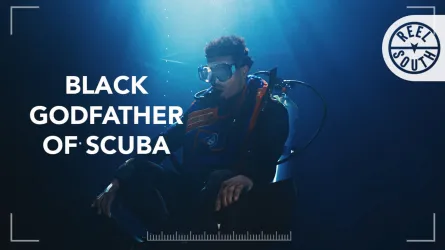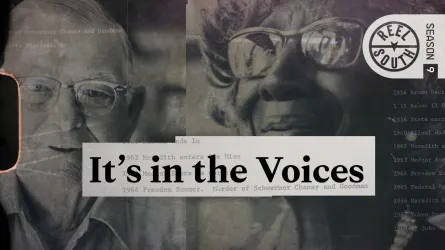This week, we're featuring two films from Korea, among them is Jami Bennett's 'Ten by Ten,' which features Jessica opens a Tennessee-style diner out of her home in Jeju, South Korea after leaving in the country for more than a decade. But after appearing on one of the country’s most popular television programs, she and her husband Dongseop must adjust to the shock of newfound TV fame, the crowds of curious new customers it brings, and the growing uncertainty of a global pandemic.
Before the Reel South premiere of 'Ten by Ten,' digital produce Heather Nunerley connected to Jami to interview her about her filmmaking process, how Jessica is doing today, what her next project is, and more. If you haven't already, stream 'Ten by Ten' on PBS online today.
This interview has been edited for clarity and length.
Heather: After watching your film, what do you hope resonates with the Reel South audience?
Jami: Ten by Ten explores a number of themes: food, home, and celebrity to name a few. But at the heart of it, I think it’s a story about identity and belonging. For anyone else who has been removed from the places and the people they call home and experienced those deep pangs of homesickness, finding ways to keep that connection forged is so important. That want of connection is why Jessica opened the Tennessee Table in the first place.
And after years of living in a country where she struggled to conform, it turns out her uniqueness was the key to belonging all along. Running this restaurant has ultimately connected her with the Korean community in a truly meaningful way. Because every time a customer walks through the door, Jessica gets to share a part of who she is and where she’s from… and I think that’s such a beautiful way to belong.
Heather: How did the film come about? How did you find your subjects?
Jami: Ten by Ten was not the film I originally set out to make.
I flew to Jeju, South Korea in the summer of 2021 to research and film a documentary about gijesa for my master’s thesis. Gijesa is a kind of memorial banquet ceremony many Korean families perform to honor their ancestors. My sister Jessica has lived in Korea for more than a decade, and having lived there nearly four years myself, I had witnessed my brother-in-law Dongseop perform this ceremony with his family many times. This was the initial subject of the documentary, but the COVID-19 pandemic had other plans.
Frequently changing immigration and quarantine policies delayed my arrival in Korea by more than six weeks and the opportunity to document the entirety of the ceremony passed me by. However, I just so happened to be there when Jessica and Dongseop were going to be featured on a Korean TV docuseries called “Screening Humanity.” We had no idea of the chaos to come. So I picked up my camera, captured the story as it unfolded, and got to witness a truly extraordinary moment in their lives.
Heather: Can you describe the creative process and how you landed on that editing style?
Jami: I think my editing style is heavily influenced by my background in music, so I often think of editing in musical terms. Pacing is about establishing a tempo. Building layers of dialogue, image, and sound feels a lot like building layers of harmony. I tend to treat each individual sequence like a song, with its own rhythm and emotional tone. The family dog lounging lazily on the porch in the quiet of the morning? Adagio. The storm in the distance drawing closer to the island every hour? Accelerando. Once those sequences were built, it was just a matter of making sense of their order and playing with transitions.
That being said, it should come as no surprise that the actual music used in the film would be of great importance to me. Jessica tries to evoke a sense of home with the music she plays in the restaurant, so I endeavored to do the same within the film. Will Cassell and Dan Boner are two brilliant bluegrass musicians in our hometown area of East Tennessee, artists that frequent our own playlists. Their music just sounds like home and they were kind enough to let us use it in the film. Will’s instrumental work in particular was a genuine ally in the editing process. There was a real synergy between the dynamic style and rhythm of his music and the emotional tones of the story that just worked.
Heather: How would you describe Jessica’s food?
Jami: There are a lot of restaurants out there attempting to reinvent the wheel when it comes to the burger, and Korea has its fair share of interesting variations. We’ve seen everything from pork burgers with brown gravy and candied beets to shrimp burgers on squid ink buns. I’ve got an adventurous palette, but there are burgers you try and then there are burgers you crave. Jessica’s is the latter.
Her menu is no-frills, fresh, comforting, and delicious. Classic cheeseburgers, hot chicken sandwiches, coleslaw, french fries, hand-dipped milkshakes… all made from scratch with heaps of love and care (and like any great cook, a dash of obsession). She visited more than half a dozen local butchers to find beef with just the right marbling. The recipe she uses to make her hamburger buns was trial number 36. And that slice of tomato on your burger? It most likely came from her own garden because she got up at 3 am in the middle of a typhoon to make sure her plants were well-protected.
But you don’t have to know all of that to know her food is made with love. You can taste it.
Heather: Do you have any updates to share about your subjects that you can share with us?
Jami: Jessica and Dongseop continue to run the Tennessee Table out of their home in Jeju with gusto. Much of the initial excitement from their appearance on national television has died down, though they still experience the occasional influx of crowds – a new audience is found whenever reruns of their show are aired. A few months ago, they decided to knock down another wall or two and expand the restaurant to accommodate more customers. So I’m happy to report that what was once a “ten-by-ten” space is now officially a twenty-by-twenty.
Heather: What are you working on next? Anything cool to share?
Jami: I’m currently in the research phase for my next documentary project on healthcare in Tennessee and the individuals who have dedicated their lives to making it more accessible. I hope to start filming next spring.
I’m also attempting to write my first screenplay, based on the life of my great-great grandfather – a logger from the hollers of East Tennessee who was well-known in his local area for his knowledge of folk songs. Thanks to a chance encounter with a record producer in the 1960s, his voice is forever preserved on an actual album and I’m writing a story about that event.
Heather: Can you tell us your favorite part of the film?
Jami: Jessica’s morning hair and makeup routine is a favorite scene of mine. Her sense of humor really shines through here, but it’s also a moment of genuine vulnerability.
I think makeup in particular is often dismissed as superficial or frivolous, but for many, it holds power. It can be used as a confidence booster, a creative outlet, or even camouflage. But for Jessica… it’s armor.
Jessica has been thrust into the public spotlight overnight. New customers are showing up in droves, hungry for both her food and her attention. The pressure to keep up with the sudden demand is intense and she’s overwhelmed by the constant social interaction and recognition. So in the midst of so much chaos, she puts on her “shield”. She styles her blonde locks into the ultimate hairdo of defiance – the mohawk – and paints her lips ruby red, and it makes her feel impervious. Of course, it's impossible for others to see the full effect of her makeup through the mask she wears over her nose and mouth – courtesy of the COVID-19 pandemic – but she knows the red lipstick is there, and that’s what matters.
Category
Share


